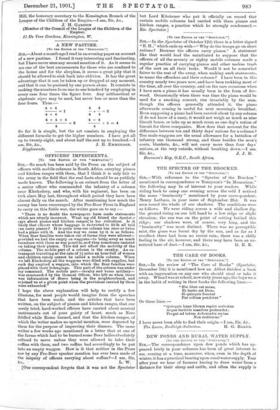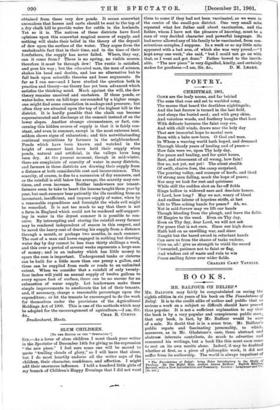DEW PONDS AND RURAL WATER SUPPLY.
[TO THE EDITOR OF THE " SPEC PATOR."]
Sm,—The correspondence upon dew ponds which has ap- peared lately in your columns has been of great interest to me, coming at a time, moreover, when, even in the depth of winter, it has a practical bearing upon rural water supply. Year after year we hear of farmers having to draw water from a distance for their sheep and cattle, and often the Supply is obtained from these very dew ponds. It seems somewhat anomalous that horses and carts should be sent to the top of a dry chalk hill to provide water for cattle in the lowlands. Yet so it is. The natives of these districts have fixed opinions upon this somewhat magical source of supply, and nothing will shake their belief in the theory of the deposit of dew upon the surface of the water. They argue from the unshakeable fact that in their time, and in the time of their forefathers, the supply has never failed. Where, they say, can it come from ? There is no spring, no visible source, therefore it must be through dew ! The rustic is satisfied, and goes his way ; but the educated man, the man of science, shakes his head and doubts, and has no alternative but to fall back upon scientific theories and loose arguments. So far as I can see—and I have studied the question both in practice and theory—no theory has yet been advanced which satisfies the thinking mind. Much against the will, the dew theory remains unsolved and unshaken. If these ponds, or water-holes, were on hill-tops surrounded by a higher range, one might find some consolation in soakage and pressure; but often they are situated upon the top of the highest hill in the district. It is hardly possible that the chalk can become supersaturated and discharge at the summit instead of on the lower elopes. Another strange circumstance, or fact, con- cerning this hidden source of supply is that it is fairly con- stant, and even in summer, except in the most extreme heat, seldom shows signs of exhaustion ; and this notwithstanding continual requisitions by farmers in the neighbourhood. Ponds which have been known and watched in the height of summer heat have held their supply when ponds, natural and artificial, in the valleys have long been dry. At the present moment, though in mid-winter, there are complaints of scarcity of water in many districts, and farmers in these districts are drawing their supply from a distance at both considerable cost and inconvenience. This scarcity, of course, is due to a succession of dry summers, and as the rainfall is still below the average, the scarcity may con- tinue, and even increase. Neither landowners nor tenant- farmers seem to take to heart the lessons taught them year by year, but each summer bear patiently the ills resulting from an inconstant, insufficient, and impure supply of water, when by a reasonable expenditure and foresight the whole evil might be remedied. It is not too much to say that there is not a farm in England which could not be rendered self-support- ing in water in the dryest summer it is possible to con- ceive. By intercepting and storing the rainfall every farmer may be rendered independent of season in this respect, and be saved the heavy cost of drawing his supply from a distance through a month, or perhaps two months, in each summer. The cost of a man and horse engaged in nothing but drawing water day by day cannot be less than thirty shillings a week, and this over a period of several weeks represents a large sum of money; and in an industry which has little money to spare the sum is important. Underground tanks or cisterns can be built for a little more than one penny a gallon, and these can be supplied from roofs or roads to an unlimited extent. When we consider that a rainfall of only twenty- four inches will yield an annual supply of twelve gallons to every square foot of surface, there can be no excuse for an exhaustion of water supply. Let landowners make these simple improvements to ameliorate the lot of their tenants, and, if necessary, charge a reasonable percentage upon the expenditure; or let the tenants be encouraged to do the work for themselves under the provisions of the Agricultural Holdings Act of 1900. This is one of the methods which may be adopted for the encouragement of agriculture.—I am, Sir, Brockenhurst, Hants. CHAS. E. CURTIS.











































 Previous page
Previous page